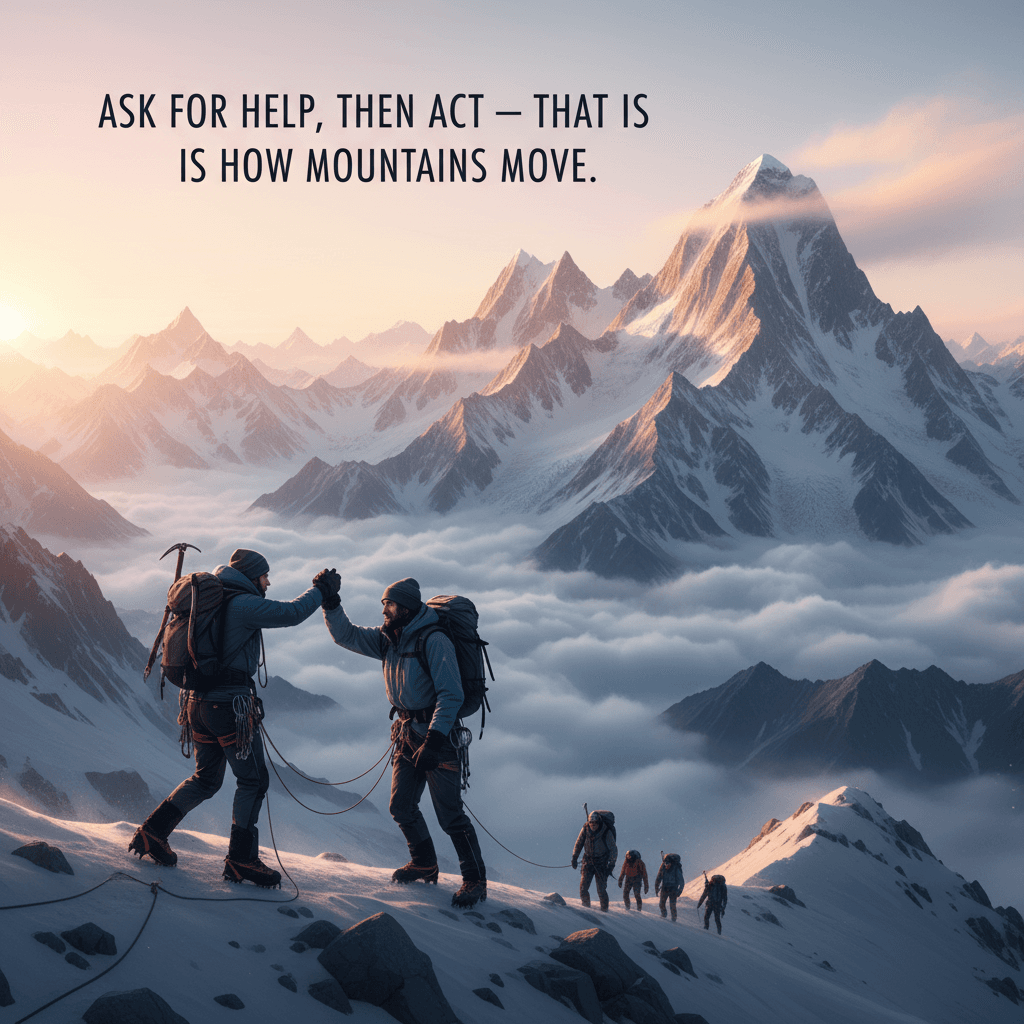Ask Together, Act Boldly to Move Mountains
Created at: October 9, 2025

Ask for help, then act — that is how mountains move. — Helen Keller
The Two-Step Engine of Change
At its core, the aphorism sketches a simple but potent sequence: first, ask for help; second, act decisively. The order matters. Requesting support turns solitary effort into leverage, while action converts potential energy into momentum. In combination, they create a flywheel—help supplies clarity, resources, and accountability; action proves commitment and attracts further allies. Thus, mountains move not by solitary heroism but by coordinated thrust, where vulnerability opens the door and initiative walks through it.
Helen Keller’s Lived Proof
Fittingly, Helen Keller’s life embodied this two-step. With Anne Sullivan’s guidance, she learned to communicate, then channeled that gift into public action—lecturing, organizing, and writing The Story of My Life (1903). Beyond personal triumph, she campaigned for workers’ rights and women’s suffrage, and partnered with the American Foundation for the Blind (from 1924) to expand access worldwide. In other words, she asked for help to gain mastery, then used that mastery to help millions—demonstrating how dependence and agency can reinforce rather than contradict each other.
What Science Says About Help and Action
Psychology and public health reinforce the point. Social ties predict survival as strongly as many biomedical factors (Holt-Lunstad et al., PLoS Medicine, 2010), implying that asking for support is not a weakness but a health intervention. Meanwhile, implementation intentions—“If situation X, then I will do Y”—reliably increase follow-through (Gollwitzer, 1999). Even bystander dynamics shift when help is requested directly: classic work by Darley and Latané (1968), and a meta-analysis by Fischer et al. (2011), show that singling out a helper reduces diffusion of responsibility. Finally, offering a brief reason increases compliance (Langer et al., 1978), suggesting that a clear why paired with a concrete next step is especially powerful.
Collective Action That Moved Real Mountains
Historical campaigns reveal the same choreography. The National Foundation for Infantile Paralysis—popularized as the March of Dimes (founded 1938)—asked ordinary Americans for small donations and volunteer labor, then mobilized labs, clinics, and public drives. This grassroots help funded breakthroughs culminating in the Salk vaccine (1955) and, decades later, near-global polio eradication under WHO-led initiatives. Similarly, volunteer fleets like the “Cajun Navy” during Hurricane Harvey (2017) used social media to request boats, fuel, and routes—and immediately acted—rescuing thousands while formal systems scaled up. In each case, public asking primed the pump; swift action kept it flowing.
A Practical Playbook for Today
Translating principle into practice, begin by naming a specific ask: who, for what, by when. Offer a concise reason—“because”—to reduce hesitation (Langer et al., 1978). Then, set an implementation intention: “If it’s 8 a.m. Monday, I will send the brief and call Taylor.” To lower friction, attach a ready-to-use first step (a draft, a template, a calendar link). Close the loop with quick updates and gratitude; reciprocity is the compound interest of collaboration. Finally, institutionalize the rhythm with weekly cadences—Ask Monday, Act Tuesday—so momentum becomes habit rather than willpower.
Avoiding Two Common Traps
Conversely, asking without acting breeds dependency, while acting without asking leads to burnout and blind spots. To avoid the first, pair every request with a self-owned next move; to avoid the second, run a premortem—“It failed; here’s why”—before launching (Klein, 2007). Maintain a simple PDCA cycle (Plan–Do–Check–Act) so feedback refines effort, and appoint a “red team” to stress-test plans before scaling. In brief, keep help-seeking honest with initiative, and keep initiative humble with input.
The Ethical Dividend of Interdependence
Ultimately, the two-step is not just efficient—it is ethical. Mutual Aid (Kropotkin, 1902) argued that cooperation is a driver of survival, while the African philosophy of ubuntu—“I am because we are”—reminds us that dignity is relational. By asking, we acknowledge we belong; by acting, we honor what belonging demands. Thus, mountains move not merely because many hands push, but because each hand learns to reach out and then to press forward—turning isolated efforts into a shared ascent.